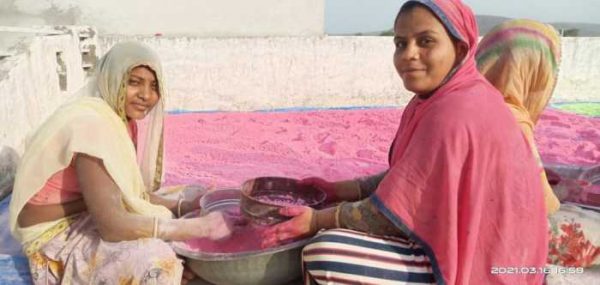
Skin-friendly herbal colors manufacturing with the support of Hindustan Zinc & Manjari Foundation
Udaipur: The festival of colors is just around the corner and preparations are in full swing, right from the markets to the common households across the nation. One can find colours in myriad hues, donning shops across various markets. And amid these colours the ones that are sparkling bright, are herbal colours produced by the women of Gurjar Kheda village of Chittorgarh, Rajasthan.
The specialty of these Holi colours is that they are purely organic, natural colours manufactured by a group of village women associated with Sakhiproject run by Hindustan Zinc in collaboration with Manjari Foundation. Having a population of about one thousand, this year Gurjar Khera has turned aromatic, due to these naturally made Holi colours, thereby bringing excitement and enthusiasm among the locals. Reason being the fact that, it is being manufactured by these rural women who have been associated with the Sakhi project for many years now. But for the first time, these natural herbal Holi colours made by them have gone beyond the borders of Chittorgarh to four other districts namely Bhilwara, Rajsamand, Udaipur, and Ajmer.

By making eco-friendly colours for Holi, these women are not only generating employment opportunities for themselves but also promoting the use of eco-friendly, best-in-class colours to the masses to celebrate Holi – one of the main festivals of the nation that is celebrated with great fervor in Rajasthan.
Mosina, a Sakhi member associated with the group informs that these herbal Holi colours are available in four shades – green, pink, red, and yellow. These eco-friendly colours are being prepared by mixing natural colours with corn flour and perfume. The women have been trained to make herbal colours under the Sakhi project.
On the occasion, Mr. Arun Misra, CEO, Hindustan Zinc said, “I am happy to see that through ourSakhi project, rural women are venturing into new businesses and becoming micro-entrepreneurs. Women are the foundation to building a strong rural India and their consistent steps towards self-reliance directly propels the economic growth of the nation. Just as we are committed to enabling and supporting women in our operations and plants, we are equally invested in the development of women in communities around us.”
Sakhi manufactured Herbal Holi colour is available under the name ‘Upaya’
These herbal Holi colours are available under the brand name Upaya Herbal colour manufactured by Sakhi Production Committee and are available in the packaging of 100gm, 200gm and 500 gm. The specialty of these colours is that it is completely skin friendly; these do not give any kind of allergy, burning sensation or the slightest form of skin irritation. Also, these colours can be immediately washed off with water.
10 women manufactured 500kg herbal colour in just three days
Narayani Bai who manufactured these herbal colours this year for the first time says that she is so happy about the effort that she will continue to make them every year now. This particular group of women has Leela, Nirma, Mangi Bai, Sharda, Anu, Kamali, Pani and Krishna as its core team. And each of them earned seven thousand rupees by making herbal Holi colours, which they say has been of great financial support to them.
Sakhi Program is propelling women to venture into small businesses/ SMEs
Maangi Bai, a member of the Sakhi project of Hindustan Zinc, says that before joining this project, most of the women of the village used to either do farming or labor-related works. But now, after gaining new knowledge about other options at work, the women got inspired to think beyond the box and run small industries with the support of the Sakhi group.
A cheerful Kamali Bai says, ‘We had never thought that the colours we used to buy each year to play Holi can be so easily manufactured by us. We didn’t know that we had the talent to manufacture it and thereby add to the family income! Now the women of our village are also manufacturing spices as well as working at Sewing Projects run by the Sakhiproject and are thus becoming more and more self-reliant by becoming the financial pillar of the family.”

